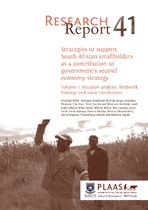Strategies to support South African smallholders as a contribution to government’s second economy strategy. Volume 1: Situation analysis, fieldwork findings and main conclusions

View/
Date
2009Author
Aliber, Michael
Baiphethi, Mompati
de Satge, Rick
Denison, Jonathan
Hart, Tim
Jacobs, Peter
van Averbeke, Wim
Metadata
Show full item recordAbstract
Within the ambit of the Accelerated and Shared Growth Initiative of South Africa, government is leading a process to define a Second Economy Strategy, and has identified the agricultural sector as a site of opportunity, potentially fostering a larger number of smallholder agriculturalists. In an effort to identify an implementable program to support the smallholder sector, this study closely analyses what makes particular South African smallholdings in various settings successful and what factors contributed to their success. A broad definition of agricultural smallholding is employed including independent operators, group farmers, subsistence farmers and commercial farmers. ‘Supporting the smallholder sector’ is conceptualised as consisting of four distinct strands, namely the prospects and measures for: improving the performance of subsistence-oriented smallholders; encouraging/enabling currently subsistence-oriented smallholders to benefit from a more commercial orientation; improving the performance of commercially oriented smallholders; and increasing participation in smallholder agriculture among those (especially rural dwellers) who do not practise agriculture.
